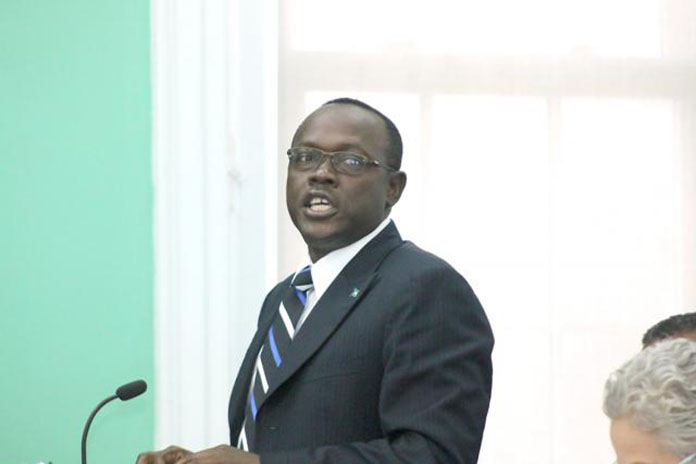
By Hon. Chester Cooper
May 9, 2018
Mr. Speaker,
I’m honored to take part in this debate on behalf of the people of Exuma, the Exuma Cays and Ragged Island.
Mr. Speaker, as we debate Access to Affordable Homes, it has been nine months since the people of Ragged Island suffered total devastation during a hurricane and very little has been done for them
Nine months since the government made fanciful commitments to those people, and nine months later they are still suffering.
Ragged Island has not nearly been restored and the dreams of a green city on Ragged Island promised by this administration remain a dream.
Not even so much as a green paper, or a white paper, or a position paper or plan for the people of Ragged Island, proffered by this Government.
Mr. Speaker, I know you may tire of hearing it, but I will never tire of advocating for Ragged Island.
Nine months, Mr. Speaker!
Had the FNM simply went to Ragged Island and said it would rebuild the administrative building and restore the school and the nurse and doctor and clinic and police station, with maybe just a few improvements, and committed to fixing the salt pond, getting fishermen back to work, then we wouldn’t be having this conversation.
But that wasn’t simple enough, Mr. Speaker.
The prime minister had to go and promise a green island.
And so, while we wait for this green island to materialize out of his head, or the heads of whoever he told nearly a year ago to come up with it, hurricane season again approaches.
No school, no clinic, no nurse, no doctor, no government building, no hurricane shelter, no reliable water, while Ragged Islanders wait for relief or this magical green island.
While I thank the minister of works for recently sending engineers down to Ragged Island, to do assessments, I must ask the prime minister, Mr. Speaker, stop the wild promises. Just give the people basic, standard services.
Give them a sense of normalcy and the basic amenities that everyone else enjoys. Ragged Islanders are aspirational, ambitious people who welcome the concept of being a model for restoration, but we are nine months in and nothing! I also thank the Ragged Island Restoration Committee for their ongoing work on these issues and for showing some leadership in this regard.
I wish this could have started six months ago, Mr. Speaker.
It is absolutely beyond frustrating. Meantime, I would like to thank Head Knowles in particular, for all the assistance it has rendered to Ragged Island. My thanks especially go out to Gina Knowles and Lia Head-Rigby and many other Bahamians and friends of the Bahamas who donated directly to Ragged Island and ensured the donations reached the people who needed them.
Nine months in, Mr. Speaker and I am advised that not a single shingle has reached the ground by NEMA or any agency of the Government. I call for a full accounting of donations made to NEMA on behalf of the people of Ragged Island.
Mr. Speaker, we are here to debate the Access to Affordable Homes Bill and the Juries Amendment Bill.
I don’t intend to contribute extensively to the Juries Amendment Bill, I am not a legal scholar, but I have no difficulty with requiring unanimous jury verdicts in capital murder cases and simple unanimous verdicts in non-capital cases.
I have no great difficulty with the death penalty, Mr. Speaker. While our courts are not perfect, they have proven fair and stringent in the process of appeals and in allowing, for the most part in a country plagued by such a troubling murder problem, to truly vet the decisions of judges, juries and the constitutionality of how these trials are conducted and those accused of murder are charged.
So, there doesn’t seem to be any unfairness inherent in the system.
However, Mr. Speaker, I do wonder if we are kidding ourselves about the death penalty in this country.
There is currently no one under the sentence of death in The Bahamas, despite the rate of murder in our country.
We seem to not be able to establish or find someone who has committed a heinous enough murder to definitively say, ‘This is the worst of the worst’.
This despite people being convicted of slaughtering men, women and children in the most gruesome manner for the most trivial of reasons.
Little boys’ bodies found discarded like trash, men set afire, likely while alive. Women beaten, molested, burned, rolled over, parents left to grieve and seek justice.
But the justice they crave, the justice that successive governments have promised them, evades them.
The promises and the action in this regard do not line up.
As a country, we are clearly beholden to the dictates of the Privy Council in this regard, and the simple fact of the matter is that as long as there is any way in our constitution to change the standard of what constitutes murder that should warrant a sentence of death, the English law lords it appears will change the standard without hesitation.
As a Parliament, we must have the will to act in the interest of the Bahamian people.
As I said, Mr. Speaker, I have no difficulty with this legislation and no problem with the jury requirements for the verdicts.
I only wish that we as members of this House would stop paying lip service to it and plot a path to clarity on the issue.
I would have no issue supporting sensible legislation in that vein.
However, if all we intend to do is talk around the issue and not take concrete steps, then let us stop playing with peoples’ emotions and make our laws clear so as to not confuse the issue.
There has been enough heartbreak and suffering. Let us not add any further, no matter how indirectly, to it.
Access to Affordable Homes Bill
Concerning the Access to Affordable Homes Bill, Mr. Speaker, let me also say that I support reasonable efforts to increase Bahamian home ownership.
A home is one of the most important purchases the vast majority of people could hope to make in their lifetime.
I say, “hope”, Mr. Speaker, because for far too long that is all most Bahamians have had to go on – hope.
There are myriad reasons that home ownership is out of the reach of many Bahamians, and even more reasons, perhaps, that many Bahamians who find themselves becoming homeowners through mortgages find themselves quickly behind in their payments, or being foreclosed upon.
Non-performing mortgages are around 15 percent in this country, Mr. Speaker. That’s about one out of every 6
homeowners who finds it impossible to pay the mortgage.
And those are the people lucky enough to qualify for mortgages.
And, unfortunately, this government doesn’t do much more than pretend to care or halfway talk plans to help.
While this bill before is interesting in its intent, Mr. Speaker, it seems a little fantastical when it comes to its practical application.
Let’s look at what it’s supposed to do, in a nutshell.
This bill is to allow people who qualify for lots in government subdivisions to import building materials tax-free for a period of two years in which they must build their homes or risk losing the exemptions.
It extends to government subdivisions in New Providence and the Family Islands.
A noble effort, but who are we fooling?
Most people can’t qualify for the $100,000 or so a local bank would facilitate for building a home’ especially after having to qualify for the lot.
Now, I’m guessing here because details aren’t often well-thought out by this government, but I’m guessing these government lots are the ones the prime minister said his government would be offering to the Bahamian people for $30,000.
Help me, because I want to help my constituents and the Bahamian people to understand. That was announced and just kind of lingered there with no follow up, so I’m interested if this is what we’re talking about.
If this isn’t that land that these people would potentially be building on, then where, exactly, is that land for $30,000 a lot that the prime minister promised? And why isn’t that connected to this?
If that is the land, then let’s bottom-line this: The lot is $30,000, the house will be, let’s say 1,000 square feet at, oh, low balling $100 per square foot for what a private contractor would charge, so we have a nice round number.
That’s $130,000 for a house and the land.
How many Bahamians can realistically afford that on their own through a financial institution?
Now, if you say the intention is to facilitate these loans through an entity like the Bahamas Mortgage Corporation, then that makes more sense. But I wonder why it would be limited to land in government subdivisions.
Hasn’t the BMC had some success in the last administration with financing low-cost homes through private developers?
Also, Mr. Speaker, who is going to buy these homes, the natural answer I suppose would be government workers.
These would, of course, be the government workers this administration has managed not to fire in the past year, or managed not to have shaken the “security” previously associated with a Government job.
I suppose the dream of home ownership will have to wait a little longer for those unfortunate souls.
So, Mr. Speaker, we have to make the imaginary leap that some undefined number of Bahamians can afford these lots and qualify for loans to build the homes.
Then, I suppose we take another imaginary leap and the minister to bring in these materials must now approve all these people, according to this bill.
But why, Mr. Speaker?
Why is the politician the one approving the permissions to get these exemptions to build?
Shouldn’t there just be a transparent process that a board or commission, or again, the Bahamas Mortgage Corporation can show you’re in compliance with and you get the approval?
Why risk a politician holding something as important as this in his hand and making him the sole arbiter of who is approved? Many Bahamians already live in fear of being victimized by this Government.
What if, for some reason, he or she doesn’t feel like approving you when your application hits their desk that day?
Is there any recourse in this bill that allows for an appeal?
Who else can you go to if you’ve followed all the imaginary rules, yet, you are denied for some reason?
I don’t see any provision that says you must be informed of why you’ve been denied, or is this Bill only intended for friend’s family and FNMs.
Then, Mr. Speaker, let us imagine that the minister does just this, every day. And he’s not in Cabinet and at speaking engagements and dealing with every other facet of the ministry. Is that truly a transparent, accountable step in the ease of doing business?
Will it allow for a people to build their homes in a timely manner?
Particularly if the lending institution demands proof of government tax exemption approval before finalizing the loan within a time before the terms expire as most now do with stamp tax, another chicken & egg dilemma. This is why a defined, clear, transparent apolitical approval process is required.
Let’s talk permitting, Mr. Speaker.
If homes are being built one by one, then there would need to be separate permit processes, unless this bill somehow changes what now occurs within the Ministry of Works.
Mr. Speaker, it appears that this bill is about getting the government out of building homes, which I think is a mistake without an overhaul of the many of the pitfalls associated with going directly through a private contractor. Building a home is one of the most stressful experiences imaginable in The Bahamas as we all know.
The government assumes, incorrectly, I believe, that some private contractors, barely regulated now, will not take advantage of these homeowners, the lower income most vulnerable ones likely to be single mothers. Let’s not kid ourselves.
Who will monitor these projects to make sure the timelines are met and people are not taken advantage of?
I hope the government is not shirking its responsibility to protect low income homeowners by transferring oversight to private citizens, the taxpayers.
What baffles me about this is that right now, the minister of housing is already afforded tax exemptions for Government housing. Do we really need legislation for this?
This administration clearly wants to develop subdivisions and lots and hand them over to contractors perhaps to build homes for Bahamians, thus enabling Bahamians to build with the same tax exemptions afforded to the minister of housing.
And that’s not a bad idea in theory at all.
However, the model assumes that those savings will be passed on to the homebuyer.
But with or without this bill, the government still has to find the land and fund the infrastructure, otherwise you still put home ownership out of the hands of most Bahamians. Has the Government done an assessment on cost of infrastructure and is it suggesting that it will absorb such cost should it come to more than $30,000 per lot?
So, in addition to making sure the permit process at the Ministry of Works is not onerously protracted and the minister has time for this and will not be biased in the approach to this as a politician, you still need to cause the Ministry of Works to be flexible in its approach to reduce the cost of infrastructure for these homeowners. This is what we must address if we will truly make home ownership more affordable.
We must also consider the uniqueness of the Family Islands. In Exuma for example, even after houses are built utility companies BPL in particularly often charge exorbitant amounts sometimes thousands of dollars, to connect a homeowner in cases where a home may be a far set back from the main road, as is often the case. This is something we ought to address as well.
In my opinion, a more careful analysis of the reduction of taxes on building materials and low cost land transactions including value-added tax need to be looked at to allow more access to home ownership and to make this bill effective, make home ownership more in the grasp of the average Bahamian, young couples, striving young men and single mothers.
We also, Mr. Speaker, have to carefully considering the National Economic Policy for Foreign Investment in real estate which drives up the cost of land and costs of homes for locals. Perhaps the time has come for more shrewd management of our land bank. Perhaps the time has come where long term leases become the preference for foreign investors rather than outright purchases of Bahamian land.
After decades of watching Bahamians get squeezed out of the home ownership market, we have to reconsider how we approach this imbalance.
Notwithstanding the gyrations we make with bills like this one, access to funding remains one of the more stubborn obstacles to home ownership. One way may be to find more flexible financing options for first home Bahamians that the government can codify in law.
Another way to have more affordable homes might be to look at new construction systems used elsewhere in the world that would still conform to our building code. Our Ministry of Works must be flexible and swift in assessing and approving new systems where they meet our code. It is generally observed that we are slow to embrace new systems but perhaps more creativity is required to buck the status quo and make owning a home more affordable.
I am told, Mr. Speaker, that under the previous administration, systems were advances to build two-bedroom homes for less than $40,000 each.
That is of course, with the concessions and the bulk buying power of the government.
It is far less expensive per home to order and ship and build for 100 homes than it is to build a single home. This is one of the key drawbacks with this government policy to shift from building homes to selling individual lots. If the government will not be building houses, what will become of the staff whose job it is to oversee construction? Will they also be fired?
Mr. Speaker, I also have a concern about what is to become of this land that the shantytowns are now on that the government has pledged to clear out. I also have some concerns on how and where the residents will be relocated. I await the government’s white paper on how it intends to address this issue.
Wrapping up, Mr. Speaker, as I indicated, a lot of this bill and surrounding policy strikes me as a way for government to get out of the home building business. And that is a truly, misguided and probably disastrous approach. Rather than laying ad-hoc bills this government should fully articulate a comprehensive and progressive plan to make homeownership more attainable and affordable.
This haphazard bill raises more questions than answers.
On the face of it, this is not a sustainable program in New Providence due to the scarcity of Government land. Perhaps the other side will confirm to this house the amount and location of remaining Government land inventory in New Providence?
Section 7 (4) of the Act talks about retaking possession or title of a serviced lot. Which bank will lend money for these lots knowing that their collateral might be in trouble in two years? In the case of an individual who might marginally qualify, which bank will lend to them if they risk losing exemption and need more money to build considering the additional costs?
If the proposed homeowner can buy a lot and build a home with cash not needing a bank in three years, who is this program really designed to help?
How do these exemptions help local business and employment in local businesses? We use to encourage Bahamians to shop at home as the job you save might be your own, did we not?
Conclusion – the Government Role for Social Empowerment
The government’s responsibility should be to foster social and economic empowerment and to assist in uplifting Bahamians to become homeowners who normally couldn’t do it by themselves.
This policy and legislation further demonstrates a stark difference between this administration and the Progressive Liberal Party.
The PLP is prepared to hold hands with responsible Bahamians and mitigate the risk to put them in homes they can afford.
The FNM clearly prefers a hands off approach and would have people who have very little means and protection to figure it out for themselves.
I encourage Bahamians from a young age to take charge of their financial future and resist the temptation to borrow for trivial pursuit. It’s a good idea to seek financial advice on qualifying to own a home well in advance so that you will take the right steps and wisely keep your financial affairs in order.
Mr. Speaker, to the extent that I support empowerment through homeownership, I support this bill. Like almost everything this administration cooks up, it needs work and it seems to leave Bahamians who are already marginalized and disenfranchised to fend for themselves.
If the government is not here to help the people especially the poor and dispossessed, I can’t imagine what use they are to the Bahamian people.
Mr. Speaker, on behalf of the people of Exuma, Exuma Cays & Ragged Island, I thank you.







